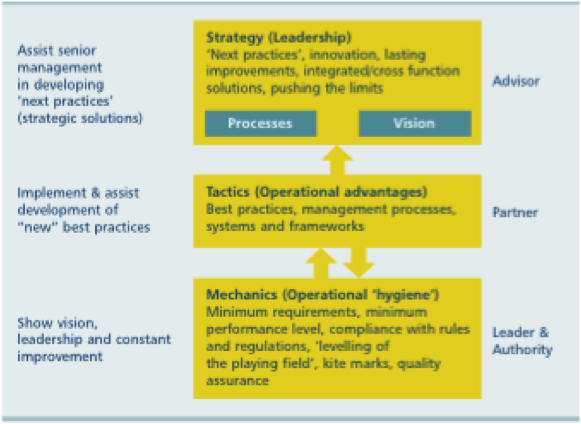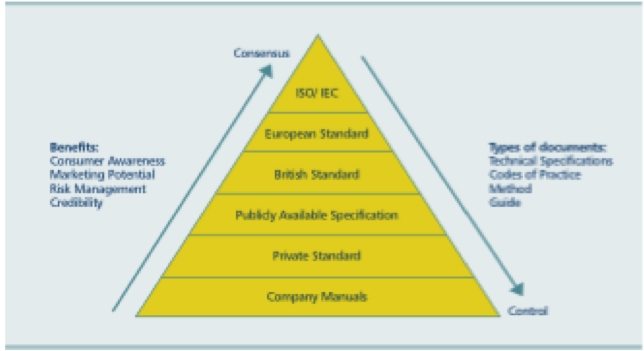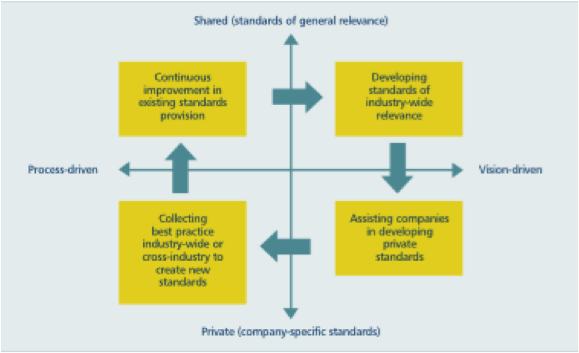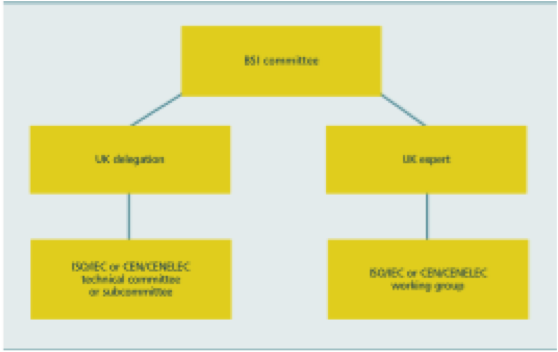Introducing Standards
This is a short introduction to the world of Standards outlining how they are developed.
A standard is a document defining best practice, established by consensus and approved by a recognized body (such as BSI, ANSI or ISO). Each standard is kept current through a process of maintenance and review whereby it is updated, revised or withdrawn as necessary.
Standards are designed to set out clear and unambiguous provisions and performance objectives in order to help trade and communication but may also meet other needs.
For example, they might improve the use of resources, assist with bringing products from development to market, stimulate innovation through the quick and efficient dissemination of critical information, or improve the quality of life through health, safety and environmental requirements. Although standards are voluntary and separate from legal and Regulatory systems, they can be used to support or complement legislation.
Some European Standards have been developed to support certain European (EU) directives by providing the simplest way of proving conformity.
These standards in many cases are performance based rather than prescriptive.
The BSI manages UK interactions with the standards bodies for Europe: the European Committee for Standardization (CEN) and, through the British Electrotechnical Committee, the European Committee for Electrotechnical Standardization.
Similarly, BSI is the British point of contact for the worldwide standards bodies: the International Organization for Standardization (ISO) and, through the British Electrotechnical Committee, the International Electrotechnical Commission (IEC). Each country will have its own relationship with ISO.
Standards are developed when there is a defined market need through consultation with stakeholders and a rigorous development process.
New areas for standardization are often developed through fast-track mechanisms like the publicly available specification (PAS) via BSI Professional Services.
Formal standards in more mature areas are developed through a committee structure that operates at the national, European and international levels.
For fast track standards, stakeholders are drawn together in a consortium model where consultation takes place through steering groups and review panels chosen to be representative and close to the business issues, and also through any standing committees in related areas.
For formal standards, national committees represent their communities in order to develop standards and related documents by consensus. They include representatives of government, testing laboratories, suppliers, consumers, academic institutions, societal interests, business, manufacturers, regulators and trade unions. European and international committees represent the countries interested in the subject matter with the aim of reaching consensus, through expert delegations nominated by the relevant national standards bodies.
Types of standard
Formal British (BS), European (EN) and international standards (ISO/IEC) are developed according to strict rules to ensure that they are transparent and fair. They follow the technical committee process which incorporates the following stages:
- Proposal for new work
- Project acceptance
- Drafting
- Public comment period
- Approval
-
Publication.

There is, however, also a range of other documents with partial consensus:
- Draft for development – DD • Guide – European Committee for Standardization CEN/CLC, or ISO
- Technical specification – CEN/CLC/TS, ISO or IEC/TS
- Technical report – CEN/CLC/TR, ISO or IEC/TR.
- For some users of standards, particularly those in fast-changing technology sectors, it is often more important to agree on a business solution and publish it quickly before going through the checks and balances needed to become a full consensus standard. Therefore, BSI, CEN / CENELEC and ISO / IEC have developed a range of products which are not full standards but allow publication before full consensus. These publications are:
- • Publicly available specification – PAS (the new deliverables of fast- track standardization)
- • Private standard – PS (commissioned by specific organisations)
- • international publicly available specification – ISO/PAS
- • European or international workshop agreements – CWA/IWA/ITA
- • business related books, CD-ROMs (e.g. Guides, Codes of Practice, compliance workbooks, text targets, surveys etc)
- • Published document – PD.
- Lead times for standards vary from a matter of months to several years. British standards are usually developed within 12–15 months, whilst international standards take around 3 years. Commissioned standards such as PAS and PS can be developed within months to meet customer requirements.
-

- British Standards facilitates the development of full consensus standards through committees representing interested parties.
- Committee membership is voluntary and DTI funding is available for some activities. Complementary to this, BSI Professional Services facilitates a full range of collaborative and consortia services which are funded directly by participating organisations.
- Committees develop national standards and provide the UK input to international projects. BSI staff, Programme Managers and Committee Managers provide defined levels of support to the committees based on an agreed allocation of service that has been calculated according to the levels of importance and activity of the committee’s current work programme.
- For national projects support is provided by editorial staff, Content Developers. Delegates and experts to international committees are nominated by national committees.
-

- In certain circumstances Consortia can develop the fast track new deliverable like PASs as well as offering a full range of support services like post standardization marketing and PR.
- BSI committees usually include representatives from trade associations, academic institutions, government departments and other interested groups. Companies may nominate people to committees through their trade association.
- If someone has a specific area of expertise, a committee may co-opt them for a specific task or an allotted time.
- A member of a UK committee may be nominated or appointed to attend international meetings either as a UK expert to a working group or as a national delegate to a technical committee or sub-committee. Similarly BSI consortia can commission expert input.
- Several publications describe the benefits of using standardization to achieve broader organisational and national strategic objectives. Information about these is available both from BSI and the National Standardization Strategic Framework (NSSF www.nssf.info), a joint initiative between BSI, the Confederation of British Industry (CBI), the Department for Trade and Industry (DTI) and the United Kingdom Accreditation Service (UKAS).
- The website at www.bsi-global.com describes the work of BSI and gives a range of information on British Standards.
- Projectline, the free service that enables anyone to search for British Standards, is at http://webserv.bsi-global.com/projectline/
- Public information on national committees and access to documents in the public domain are on www.bsi-global.com/Committee_Members/Ecommittees/index.xalter
- Case studies of working with BSI Professional Services to add value to businesses are available at: www.bsi-global.com.
- For more information on the Continuity Forums work in the area of standards please do contact us directly
To download a PDF version of this page please click here













